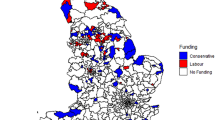Abstract
Political representation in the national assemblies isgeographic and elected representatives care about whogains and who loses in their electoral districts. Since legislators are re-election oriented, theirchances of electoral success are directly associatedwith the net benefits delivered to their constituents. In this perspective, geography is not only the basisfor political organisation and representation, butalso the hallmark of distributive politics. In thiscontext, it is likely that locally elected politiciansand party leaders standing in national elections wouldtend to cooperate in pre-election dates. In thispaper we argue that local administrators have anincentive to manipulate local government outlays inconnection with national election dates to enhance there-election prospects of their national party leaders. In particular, given the matching character ofnational grants with local investment spending, weexpect that in pre-election dates local policy-makerswould be induced to raise investment outlays beyondtheir standard growth rate. This would determineinefficient local public spending as a result of thegeographically-based system of democraticrepresentation. The case study under our investigationis the behaviour of Italian local policy-makers inconnection with national election dates.
Similar content being viewed by others
References
Alesina, A. and Rodrik, D. (1994). Distributive politics and economic growth. Quarterly Journal of Economics 109: 465-490.
Aranson, P. and Ordeshook, P. (1981). Regulation, redistribution and public choice. In R. Niemi and H. Weisberg (Eds.), Probability models of collective decision making. Columbus: Merrill.
Banerjee, A., Dolado, J., Galbraith, J.W., and D.F. Hendry (1993). Co-integration, error correction, and the econometric analysis of non-stationary data. Oxford: Oxford University Press.
Becker, G.S. (1983). A theory of competition among pressure groups for political influence. Quarterly Journal of Economics 98: 371-400.
Buchanan, J.M. and Tullock, G. (1962). The calculus of consent: Logical foundations of constitutional democracy. Ann Arbor: University of Michigan Press.
Centorrino, M., Limosani, M. and Navarra, P. (1999). Analisi del ciclo politico di bilancio nelle elezioni locali in Italia: primi risultati, Stato e Mercato, forthcoming.
Coughlin, P. (1986). Elections and income redistribution. Public Choice 50: 27-99.
Coughlin, P., Mueller, D.C. and Murrel, P. (1988). Electoral politics, interest groups and the size of government. University of Maryland, mimeo.
Fenno, R.F. (1978). Home style: House members in their districts. Boston: Little, Brown.
Ferejohn, J. (1974). Pork barrel politics: Rivers and harbors legislation, 1974–1968. Standford: Standford University Press.
Ferejohn, J. (1986). Incumbent performance and electoral control. Public Choice 50: 5-25.
Fiorina, M. (1977). Congress: Keystone of the Washington establishment. New Haven: Yale University Press.
Fiorina, M. and Noll, R. (1978). Voters, bureaucrats and legislators: A rational choice perspective on the growth of bureaucracy. Journal of Public Economics 9: 239-254.
Intriligator, M. (1979). Income redistribution: A probabilistic approach. American Economic Review 69: 97-105.
Meltzer, A.H. and Richard, S.F. (1981). A rational theory of the size of government. Journal of Political Economy 89: 914-927.
Mueller, D.C. (1982). Redistribution, growth and political stability. American Economic Review 72: 155-159.
Myhew, D.R. (1974). Congress: The electoral connection. New Haven: Yale University Press.
Johnston, J. (1984). Econometric methods. New York: McGraw Hill.
Olson, M. (1965). The logic of collective action. Cambridge: Harvard University Press.
Peltzman, S. (1980). The growth of government. Journal of Law and Economics 23: 209-288.
Peltzman, S. (1984). Constituent interest and congressional voting. Journal of Law and Economics 27: 181-200.
Perotti, R. (1993). Political equilibrium, income redistribution and growth. Review of Economic Studies 69: 755-776.
Persson, T. and Tabellini, G. (1994). Is inequality harmful for growth: Theory and evidence. American Economic Review 84: 600-620.
Rodgers, J.D. (1974). Explain income redistribution. In H.M. Hochman and G.E. Peterson (Eds.), Redistribution through public choice. New York: Columbia University Press.
Stigler, G.J. (1971). The theory of economic regulation. Bell Journal of Economics and Management Science 5: 3-21.
Shepsle, K.A. and Weingast, B.R. (1981). Political preferences for the pork barrel: A generalisation. American Journal of Political Science 25: 96-111.
Stockman, D. (1975). The social pork barrel. Public Interest 39: 3-30.
Tullock, G. (1959). Some problems of majority voting. Journal of Political Economy 67: 571-579.
Tullock, G. (1967). The welfare costs of tariffs, monopolies and theft. Western Economic Journal 5: 224-232.
Weingast, B.R., Shepsle, K.A. and Johnsen, C. (1981). The political economy of benefits and costs: A neo-classical approach to distributive politics. Journal of Political Economy 89: 642-664.
Author information
Authors and Affiliations
Rights and permissions
About this article
Cite this article
Limosani, M., Navarra, P. Local Pork-Barrel Politics in National Pre-Election Dates: The Case of Italy. Public Choice 106, 317–326 (2001). https://doi.org/10.1023/A:1005280209630
Issue Date:
DOI: https://doi.org/10.1023/A:1005280209630




